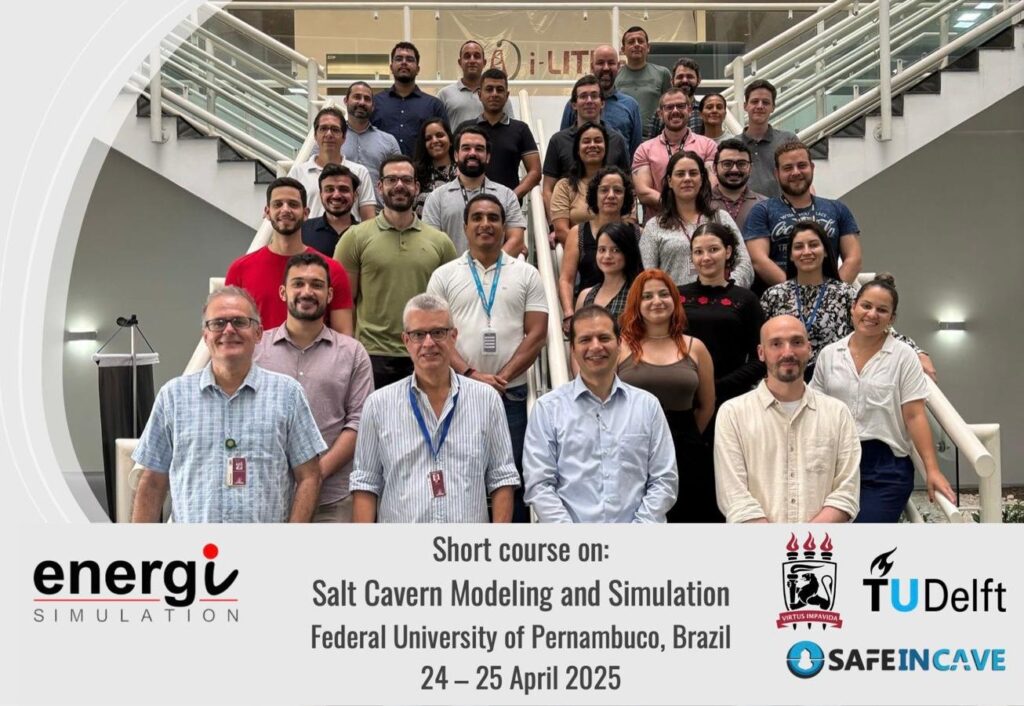
April 25, 2025
We are thrilled to share the success of a 2-day short course on Salt Cavern Modeling and Simulation! Hosted by Leonardo Guimarães, Energi Simulation Chair at the Universidade Federal de Pernambuco (UFPE), this event was held in collaboration with Hadi Hajibeygi, Energi Simulation Chair at TU Delft University, and Hermínio Honório, a senior postdoctoral researcher at the ADMIRE research group, TU Delft.
This collaboration marks the start of a promising partnership between UFPE and TU Delft, dedicated to unlocking the capacities of salt caverns for energy and climate applications.
About the Course The development of salt caverns for compressed air and hydrogen storage is rapidly gaining traction. Ensuring the safe and efficient operation of these storage systems requires a detailed understanding of the mechanical stability of salt caverns under varying operational conditions. This can be achieved through numerical simulations validated by laboratory and field observation data.
The course addressed key challenges in simulating salt caverns, many of which also align with porous reservoir modeling. Participants gained in-depth knowledge of the mechanics of salt caverns, including:
- Fundamental concepts of salt rock mechanics and constitutive modeling, with guidelines for parameter calibration.
- Mathematical and numerical formulations of nonlinear mechanics.
- Boundary conditions aligned with in-situ cavern loads.
Lecturers: Hadi Hajibeygi & Herminio Honório
• Hadi is a professor of Geo-Energy Solid and Fluid Mechanics at Delft University of Technology. His research focuses around advancing modeling and simulation sciences for processes in geological reservoirs – both experimental and computational, especially addressing multiscale heterogeneity and uncertainties across scales. Hadi holds a PhD with medal from ETH Zurich in Fluid Dynamics and was a Postdoc Scholar at Stanford University Energy Resources Engineering before joining TU Delft in 2013. The applications of his research include underground hydrogen storage science and technology, as well as carbon dioxide storage and well as geothermal energy exploitation.
Google Scholar: https://scholar.google.nl/citations?user=T9q3vYQAAAAJ&hl=en
LinkedIn: https://www.linkedin.com/in/hadihajibeygi/?originalSubdomain=nl
Email: h.hajibeygi@tudelft.nl
• Hermínio is a senior postdoctoral researcher at TU Delft, ADMIRE research group. He works on elastic and plastic mechanical deformation modeling and simulation of rocks under cyclic loading. He has been the main developer of the open-source SafeInCave simulator which will be used in this course. Herminio holds PhD from the Federal University of Santa Catarina in Brazil.
Google Scholar: https://scholar.google.com/citations?user=dF8ecL4AAAAJ&hl=en
LinkedIn: https://www.linkedin.com/in/herminioth/
Email: h.tasinafohonorio@tudelft.nl
Hands-On Practice with SafeInCave A highlight of the course was the hands-on practice with the open-source simulator SafeInCave. Participants created geometries, configured input files, and explored diverse scenarios. They were also encouraged to develop their own constitutive models and simulations, fostering collaboration and innovation through result comparisons and discussions.
Engaged and Dedicated Participants The audience included graduate students at various stages of their professional journeys, as well as industry professionals. Their exceptional dedication and interest in fluid storage in salt caverns, both in its general applications and specific geomechanical behavior, made this event particularly impactful.
Leonardo Guimarães expressed, “Our sincere gratitude goes to Hadi and Hermínio for the exceptional course they’ve delivered at UFPE. Their insightful lectures and inspiring enthusiasm have not only enriched our team but also sparked meaningful conversations on this strategic topic. Their dedication to sharing their knowledge—particularly through the SafeInCave open-source simulator, developed at TU Delft—has opened exciting new perspectives for collaboration. UFPE students are now actively contributing to SafeInCave’s evolution, expanding the scientific and user community together.”
This partnership between UFPE and TU Delft paves the way for long-term strategic exchanges of knowledge in energy and climate-driven topics.
We are looking forward to many more collaborations and shared achievements in the future as we build a sustainable legacy together!